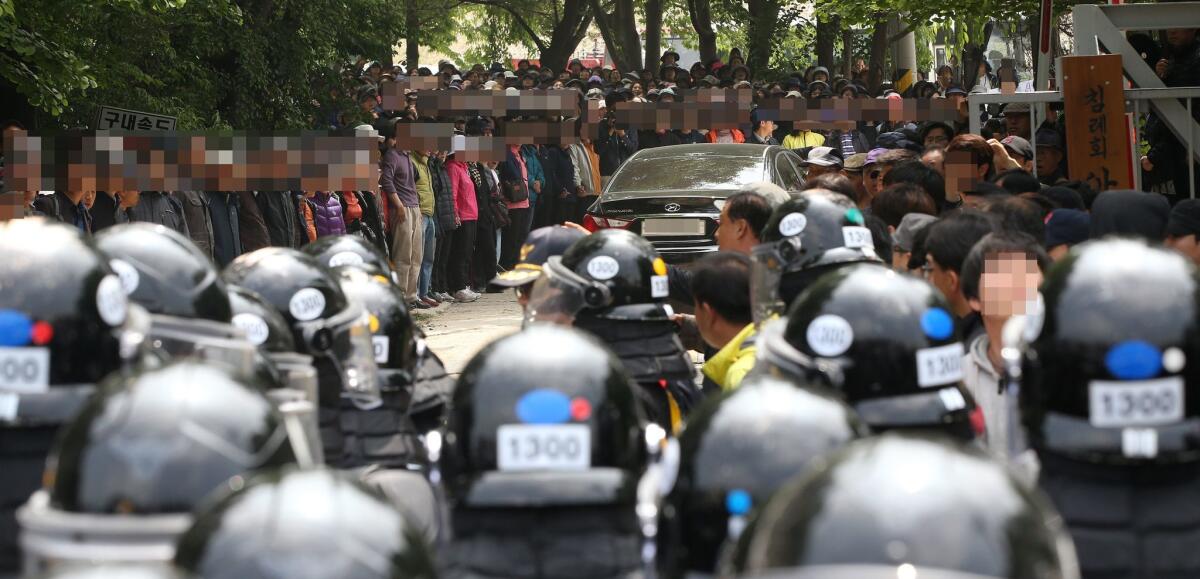Church compound raided in probe of South Korean ferry tragedy

- Share via
Reporting from Anseong, South Korea — South Korean authorities raided a sprawling compound south of Seoul on Wednesday in an unsuccessful search for a reclusive millionaire with ties to the doomed Sewol ferry.
Tycoon Yoo Byeong-eun is wanted for questioning in connection with Cheonghaejin Marine, the company that operated the ferry, which sank off South Korea’s western coast April 16, leaving more than 300 dead or missing.
Dozens of prosecution officials went to the Evangelist Baptist Church compound in Anseong accompanied by about 1,500 riot police. They entered without resistance from hundreds of church members who had pledged to block officials if they tried to search for Yoo.
Across the compound’s front gate is a sign addressed to the government that reads, “Let’s go to the end -- we’ll see what happens!!!” The banner is an implicit response to prosecutors’ pledge to pursue Yoo -- nicknamed the “millionaire without a face” for his reclusiveness -- “to the end.”
Yoo was summoned in recent days to appear for questioning in the ferry case but ignored the requests. Prosecutors have said they suspected the 73-year-old Yoo could have been holed up in the compound, although the church, a Christian sect believed founded by him and others, says it has no knowledge of his whereabouts.
Church spokesman Cho Kye-woong said before Wednesday that prosecutors had visited the compound and questioned members and that the church had nothing to add. Yoo, a pastor turned tycoon, is no longer involved with the church, he said.
“The only distinction in our church is that some members can preach to others because they have exceptional knowledge of the Bible. Mr. Yoo was one of those, but he stopped preaching several years ago,” Cho said recently in an interview outside the compound.
Tension remains high as South Korea mourns the Sewol disaster. The ferry went down after leaving from the mainland port of Incheon en route to the holiday island of Jeju. Hundreds of high school students were among the passengers. Officials said this week that 172 people survived, 287 bodies had been recovered and 17 people remained missing.
President Park Geun-hye made her most direct public apology yet during a televised address early Monday. She also pledged to disband the country’s Coast Guard due to its ineffective response to the sinking.
On Sunday, an unnamed official with the prosecution told the Joongang Ilbo newspaper that authorities plan to have Yoo in custody “within this week, no matter what.” Such comments appear to have mobilized church members to gather at the compound.
Barbed wire is piled at each side of the compound’s retractable iron gate, which opens every few minutes to let in luxury sedans and cargo trucks. A steady stream of people and cars flows in, while almost no one comes out.
What little is known about Yoo’s background indicates he was born in Japan when Korea was part of the Japanese empire. According to Korean media reports, he got his start in business when he took over a textile company. He then moved into toy manufacturing and later shipping. He reportedly became a pastor in the 1960s.
A public relations firm representing Yoo says he has retired from business and is working as a photographer under the alias Ahae. The public relations firm wrote in a recent press release that Yoo has “devoted his last several years exclusively to his artistic endeavors.”
Yoo has made no known public appearances since the ferry sank. His two sons, Yoo Hyeok-ki and Yoo Dae-kyun, reportedly were the day-to-day managers of Cheonghaejin and are wanted by prosecutors for questioning about Cheonghaejin’s accounting, ownership structure and internal procedures.
Yoo Hyeok-ki is in the U.S., though his place of residence is unknown, while Dae-kyun is believed to be in South Korea and is on a wanted list.
Cheonghaejin has been criticized for not following safety regulations and failing to properly train the crew in how to evacuate in an emergency.
On the day it went down, the Sewol was carrying 3,608 tons of cargo, far exceeding its legal capacity of 987 tons, which shipping analysts believe led to the ferry capsizing after making a turn. The captain of the ship evacuated as the ship was sinking, while students were instructed not to leave their cabins.
Last week the captain of the Sewol and three crew members were indicted on charges of homicide for fleeing the ferry before passengers had been evacuated. Eleven other members of the crew were charged with negligence.
The government has faced public fury and accusations of botching the rescue effort.
On May 9, families of youths who died in the ferry sinking attempted to march to the presidential office in Seoul but were blocked by riot police. They then held a sit-in protest at the side of a road. “In this country the government is seen as being ultimately responsible for everything,” said Michael Breen, author of “The Koreans.” “Even if a company is flagrantly violating state regulations, it’s the government that people complain to.”
But attention has also turned to the Yoo family and the church in the quest to find those ultimately responsible for the sinking.
Cho said the church is unfairly still identified with a 1987 case in which more than 30 members were found dead after being bound and gagged in a factory outside of Seoul. The deaths were ruled a mass suicide, and Yoo was cleared of any involvement.
One middle-aged woman at the compound, choking on tears, said, “This religion saved me when I was young, and now I can’t believe we’re being persecuted.”
More to Read
Sign up for Essential California
The most important California stories and recommendations in your inbox every morning.
You may occasionally receive promotional content from the Los Angeles Times.













